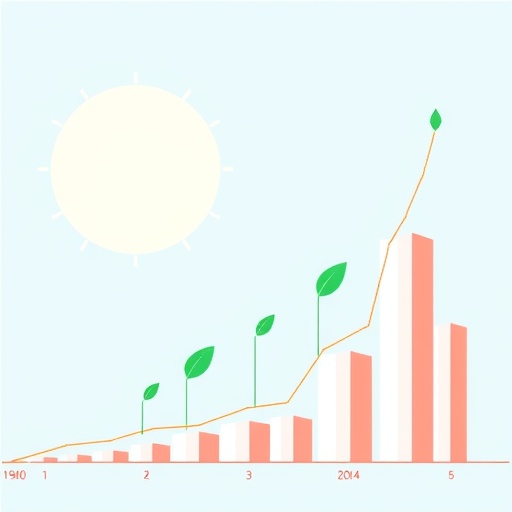In the unfolding narrative of global economic strategies, Sustainable Development Goal 8 (SDG 8) stands as a beacon, championing inclusive and sustainable economic growth. The path towards this ambitious vision has been meticulously charted in a novel analysis presented by Verma, Kumar, and Mashroofa. Their work, which spans a decade from 2015 to 2025, embarks on a deep dive into the evolving research landscape surrounding sustainable inclusive economic growth. This exploration is not merely academic; instead, it serves as a critical framework for policymakers, researchers, and students dedicated to unlocking the full potential of economic growth that benefits all layers of society.
At the heart of this comprehensive bibliometric analysis lies the thoughtful utilization of advanced tools such as Biblioshiny and VOSviewer. These sophisticated platforms allow researchers to sift through vast oceans of scholarly articles, unveiling intricate patterns and trends in sustainability research. The authors adeptly leveraged these technologies to map out the significant shifts in research focus, highlighting emerging themes and gaps that require urgent scholarly attention. This meticulous analysis underscores the importance of data-driven insights in shaping the future direction of economic policies that adhere to the principles of sustainability.
A striking finding from the study is the gradual but significant rise in research output relating to SDG 8. Over the past decade, there has been a marked increase in publications that approach economic growth through the lens of sustainability. Researchers have begun to recognize that economic prosperity is not solely measured in terms of GDP growth but is fundamentally intertwined with social equity, environmental stewardship, and the well-being of future generations. This paradigm shift marks a pivotal moment in economic research, one that calls for innovative methodologies and collaborative efforts across disciplines.
The authors also trace the thematic evolution of research priorities, noting a transition from conventional economic models to more integrative approaches that encompass social and environmental dimensions. This transition is indicative of a broader recognition within the academic community regarding the interconnectedness of economic systems and ecological sustainability. For instance, researchers have increasingly emphasized the need for responsible consumption and production practices, as highlighted in SDG 12, which complements the objectives of SDG 8. The study aptly notes how these interactions create a multifaceted research ecosystem, inviting interdisciplinary dialogue that extends beyond traditional economic analysis.
Moreover, Verma and his co-authors delve into the geographic distribution of research output, revealing a diverse landscape of contributors from various regions. This finding is particularly encouraging, as it suggests that sustainable economic growth is a global concern that transcends borders. Countries and institutions from both developed and developing nations have begun to engage with these critical issues, fostering an inclusive research environment. The collaborative spirit highlighted in this bibliometric assessment serves as a catalyst for knowledge exchange, inviting voices from diverse contexts to contribute to the global discussion on sustainable growth.
Equally important is the role of policy implications extrapolated from this academic inquiry. The analysis does not merely catalog existing knowledge but also highlights actionable insights that can inform policymakers. By synthesizing previous research trends, the authors identify key areas where governance can be enhanced to support sustainable economic growth. This convergence of research and policy underscores the critical function of academia in shaping effective and equitable economic frameworks that align with global sustainability goals.
The study presents a forward-looking perspective, suggesting that future research agendas must continue to explore the intricate relationships between economic growth, sustainability practices, and inclusive development. As the landscape of global challenges evolves, so too must the methodologies employed in research. Innovative approaches that integrate emerging technologies, such as big data, artificial intelligence, and cross-sector collaboration, will play an essential role in deciphering the complexities of sustainable economic growth. The authors stress the importance of continually updating research priorities to reflect the dynamic realities of the economic landscape and environmental challenges.
In conclusion, the bibliometric analysis conducted by Verma, Kumar, and Mashroofa stands as a vital contribution to the ongoing discourse surrounding sustainable inclusive economic growth. Their work not only expands the existing body of literature but also establishes a solid foundation for future research endeavors. By integrating advanced bibliometric tools, the authors provide an invaluable resource for researchers, policymakers, and advocates dedicated to fostering a more sustainable economic future. As we move further into the 21st century, the implications of this analysis will undoubtedly resonate across academic, policy, and practical domains, underscoring the beauty of convergence between economic progress and sustainable practices.
The research encapsulates a transformative outlook on economic growth, encouraging a paradigm shift that emphasizes inclusivity and sustainability. In doing so, it lays a roadmap for future investigations and interventions aimed at realizing the goals outlined in the SDG 8 framework. Ultimately, the trajectory towards sustainable inclusive economic growth highlights the promise of a collective commitment to nurturing a fairer, more equitable world for generations to come.
In summary, the insights from Verma, Kumar, and Mashroofa shine a light on the path ahead, urging stakeholders across various sectors to collaborate, innovate, and elevate discussions on sustainable economic practices. The detailed analysis serves not only to contextualize the current state of research but also to provoke thought and action towards the sustainable development objectives we all aspire to achieve cohesively.
Subject of Research: Sustainable inclusive economic growth within the SDG 8 framework
Article Title: A comprehensive bibliometric analysis of research trends in sustainable inclusive economic growth within the SDG 8 framework from 2015 to 2025 using Biblioshiny and VOSviewer.
Article References:
Verma, R., Kumar, A., Mashroofa, M.M. et al. A comprehensive bibliometric analysis of research trends in sustainable inclusive economic growth within the SDG 8 framework from 2015 to 2025 using Biblioshiny and VOSviewer. Discov Sustain 6, 1221 (2025). https://doi.org/10.1007/s43621-025-02124-6
Image Credits: AI Generated
DOI: https://doi.org/10.1007/s43621-025-02124-6
Keywords: Sustainable Development Goals, Economic Growth, Inclusivity, Bibliometric Analysis, Research Trends




